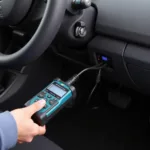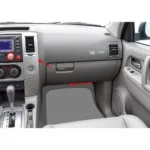OBD2 diagnostic tools have revolutionized the way we understand and interact with our vehicles. Gone are the days of relying solely on mechanics for even the simplest of car troubles. With the right OBD2 diagnostic tool, car owners and professionals alike can now delve into the inner workings of their vehicles, diagnose problems with accuracy, and even make informed decisions about repairs.
Understanding the Power of OBD2 Diagnostic Tools
OBD2, which stands for On-Board Diagnostics, is a standardized system that allows external devices to access a vehicle’s computer system and retrieve valuable diagnostic information. This information is crucial for understanding the health of your vehicle and pinpointing the root cause of any issues.
While all cars manufactured after 1996 in the United States are equipped with the OBD2 system, the capabilities of OBD2 diagnostic tools can vary greatly. From basic code readers that simply display error codes to advanced professional-grade scanners that offer bi-directional control and live data streaming, choosing the right tool depends largely on your individual needs and expertise.
Types of OBD2 Diagnostic Tools: Finding the Perfect Fit
Navigating the world of OBD2 diagnostic tools can feel overwhelming, but understanding the basic types can simplify your search:
- Basic Code Readers: Ideal for beginners, these affordable devices retrieve and display error codes, providing a starting point for diagnosing issues.
- Smartphone/Tablet Scanners: Connecting to your device via Bluetooth or Wi-Fi, these tools offer user-friendly interfaces and a range of features, including code reading, live data viewing, and even GPS tracking.
- Dedicated Scan Tools: Offering more advanced functionalities like live data streaming, graphing, and in some cases, bi-directional control, these tools are perfect for DIY enthusiasts and professional mechanics.
- Professional-Grade Scanners: The most comprehensive and expensive option, these tools are designed for expert mechanics and offer dealership-level diagnostics, programming capabilities, and advanced features.
Key Features to Consider When Choosing an OBD2 Tool
When making your decision, it’s essential to consider the following features:
- Vehicle Compatibility: Ensure the tool supports your vehicle’s make, model, and year.
- Code Reading and Clearing: The ability to read and clear both generic and manufacturer-specific codes is crucial.
- Live Data Streaming: Access to real-time data from various sensors allows for in-depth analysis of vehicle performance.
- Data Logging and Graphing: These features are invaluable for identifying intermittent problems and tracking changes over time.
- Bi-Directional Control: This advanced feature allows you to interact with vehicle systems for testing and component activation.
“Choosing the right OBD2 diagnostic tool is an investment in your vehicle’s health,” says automotive expert John Smith. “By understanding your needs and researching the available options, you can empower yourself to take control of your car’s maintenance.”
Beyond Diagnostics: The Expanding World of OBD2
The world of OBD2 extends beyond simple diagnostics. With the increasing integration of technology in vehicles, OBD2 ports are becoming gateways for a wide range of applications, including:
- Performance Monitoring: Track horsepower, torque, acceleration, and other performance metrics in real-time.
- Fuel Economy Tracking: Monitor fuel consumption and identify driving habits that impact fuel efficiency.
- Vehicle Tracking and Security: Utilize GPS tracking and geofencing features for enhanced security.
- Remote Diagnostics: Share vehicle data with mechanics remotely for quicker and more efficient troubleshooting.
OBD2 Diagnostic Tools: Empowering Car Owners and Professionals
OBD2 diagnostic tools have become indispensable for car owners and professionals seeking to unlock the secrets within their vehicles. By understanding the capabilities of these tools and the information they provide, you can make informed decisions about your car’s maintenance, saving time, money, and unnecessary headaches.
Remember, knowledge is power. With the right OBD2 diagnostic tool in hand, you can confidently navigate the complexities of your vehicle and ensure its optimal performance for years to come.
FAQ
1. Can I use any OBD2 scanner on any car?
While all OBD2 scanners can read generic codes from any OBD2 compliant vehicle, certain features and manufacturer-specific codes may require a tool specifically designed for your vehicle’s make and model.
2. How often should I use my OBD2 scanner?
It’s good practice to scan your vehicle periodically, even when no warning lights are illuminated, to catch potential issues early on. Additionally, scanning after any repairs ensures that the issue has been resolved.
3. Can an OBD2 scanner fix car problems?
OBD2 scanners are diagnostic tools and cannot fix car problems directly. However, they provide the information needed to identify and understand the root cause of issues, allowing for targeted repairs.
4. Are there any risks associated with using an OBD2 scanner?
When used correctly, OBD2 scanners are generally safe. However, it’s essential to avoid disconnecting the scanner or turning off the ignition while the engine is running, as this could potentially damage the vehicle’s computer system.
5. Where can I find reliable information about OBD2 codes?
OBDFree offers a comprehensive database of OBD2 codes and their meanings. You can also consult your vehicle’s owner’s manual or seek assistance from a qualified mechanic.
6. What is HUM OBD2 Speed?
HUM OBD2 Speed is a feature that allows you to monitor your vehicle’s speed in real-time.
7. What are the common issues related to Mazda OBD2 U1900?
Mazda OBD2 U1900 often indicates a problem with the CAN bus communication system. This could be due to various factors, including wiring issues, faulty modules, or a problematic instrument cluster.
Need Help with Your Car Diagnostics?
For expert advice and assistance with your OBD2 diagnostic needs, contact us via WhatsApp: +1(641)206-8880, Email: [email protected]. Our 24/7 customer support team is here to help you.


